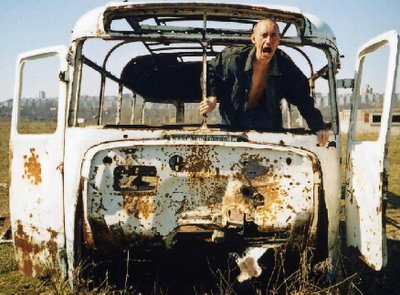 Driving around town the other day, I almost hit a squirrel.
Driving around town the other day, I almost hit a squirrel.Almost.
The squirrel was standing right in the middle of the road, and then started dodging first left, then right, then finally stopped dead center and simply froze. I swerved the car a little to straddle his position with my tires, and after I passed over him, I did not see a dead squirrel in the rear view mirror.
I once read somewhere, I think it was Outside magazine, about the problem with squirrel's perception. A reader sent in a question, asking "Since squirrels are so fast and agile, how come they keep getting hit by cars?" The reply was that since squirrels basically evolved as small tree-dwelling mammals, their senses are attuned to the threat of hawks and eagles as their primary predators. So their perception is such that they are always alert to the threat of something of a certain size swooping down out of the sky, and when they see something as big as a car, moving so rapidly, and on the ground, their minds just can't comprehend it ("This does not compute"), and they simply choose to ignore it.
And this ignorance leads to death, to pain and to suffering.
Squirrels can clearly see the car, they know that getting struck would not be a healthy option for them, and yet their little squirrel minds can't put it all together and instruct the body to run away. As a result, we have squirrel roadkill on our streets.
In the years since I've read that, I've often wondered that if a superior intelligence were to observe us, would it wonder, "Why aren't they getting out of the way? What's wrong with them? Can't they see the danger? Doesn't all that cancer tell them something?"
I don't know why I chose "cancer" as the indicator, but the punchline to the little joke I kept telling myself about the analogy between squirrels and humans always ended with that phrase, "Doesn't all that cancer tell them something?" Maybe it's due to the modern perception of cancer as the Great Riddle, the mysterious ailment that cannot be cured, and all the while, to an intelligent species observing us from a detached perspective, we're simply like little squirrels, refusing to simply get out of the way and avoid that which is obviously causing us harm.
Looking at it now, from a Buddhist perspective, I see that my intuition was correct. Cancer is simply the manifestation of impermanence at the cellular level. Everything is impermanent, nothing last forever, the entire universe is on fire. Even the cells of our bodies, if they are to last long enough to avoid all of the other perils that might destroy them, will eventually morph into forms that threaten our continued survival, and we term this morphing "cancer."
But as humans, our little homo sapien brains can't comprehend impermanence, we can't see it, we think that things will last forever, and we cling to that delusion. Yet although governments change, sea levels rise and fall, Twin Towers collapse and our hair turns grey, we think that it's wrong, something unnatural when our cells mutate, and the doctors call the mutation "cancer." Yes, it's wrong for our own survival, and I'm certainly not saying that it's not sad and tragic for the little narratives we call our our "lives," but everything, even our own survival, is subject to impermanence, just like our cells, our lost memories, our childhood fear of clowns.
Impermeable is the fire that's raging through the entire universe, constantly renewing and reinventing what the Taoists call "the 10,000 things" (meaning everything that exists), and even though the evidence is right here before our eyes, even though we have the capacity to understand it, we instead choose to ignore it.
And this ignorance leads to death, to pain and to suffering.

1 comment:
Not that this post wouldn't be a great place to rest your case...and not that it doesn't conclude your series with a resounding challenge to go do some serious reflection
Post a Comment